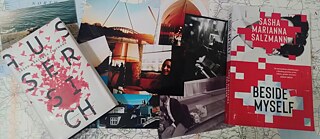January 2022
Sasha Marianna Salzmann: Beside Myself

If you enjoyed the setting and ensemble cast of Elif Shafak’s The Bastard of Istanbul, we recommend Sasha Marianna Salzmann’s Beside Myself.
The multigenerational novel seems to be a staple of translated fiction, with books interweaving the lives of a family’s different generations – especially those of the women – against the changing political backdrop of the twentieth century. It’s a format which seems less prevalent amongst British books – perhaps because it’s particularly effective in the context of dramatically changing political landscapes, or maybe just due to publishers’ preconceptions about what’s likely to sell. Either way, if (like me) you’re a fan of an ensemble cast and you like a bit of historical background when you read, then novels like Elif Shafak’s The Bastard of Istanbul (written by the Turkish author in English) offer a fantastic way to brighten dark winter evenings, with an eccentric cast of characters and a tantalisingly evocative setting.
If this sounds like your cup of tea, then I have to recommend Sasha Marianna Salzmann’s Beside Myself, in an immediate and inventive translation by Imogen Taylor. The core narrative follows Ali, who – sometime after the Gezi Park protests – arrives in Istanbul to search for her missing twin brother, Anton. Between fruitless attempts to find Anton and evenings of tea and Raki on Uncle Cemal’s flea-ridden sofa, Ali encounters Kato, a young trans man, and begins to question his own gender identity. The novel switches here between the third and the first person, tapping into a fragmented sense of self.
Interrupting this narrative are the tales of Ali’s parents, grandparents and great grandparents, a Jewish family who – between Volgograd, Moscow and Germany’s asylum centres – impress on their children the importance of being twice as good as the Germans or Russians around them in order to be half as successful. As the novel goes on, we realise that these stories are being collected by Ali, who is wry about the fallibility of the tales they pass on:
“However inconsistent the facts of family history … there was one constant: everyone in the family was very good-looking and very intelligent. That was the tradition, anyway.”
None of the characters in the book are perfect (and the cis-men come off particularly badly) – although the iron-willed Etinka, whose skill and determination ensure her position as head of a children’s TB sanitorium even through anti-Semitic purges, comes pretty close. What is impressive is how Salzmann renders each of the characters complex and contradictory, even as their own family members fail to see this complexity. This is particularly true of Valya, Ali’s mother, a talented doctor who battles anti-Semitism, an abusive husband and Germany’s dehumanising asylum system to give her children a better start in life. A joy in the book is Ali’s gradual realisation of his mother’s many layers, and his attempt to do this justice.
Purges, anti-Semitism, asylum, abuse: you could be forgiven for thinking this sounds like a grim read. Yet Salzmann and her indefatigable characters are storytellers, and they bring light and laughter to the stories they have to tell.
About the author
Annie Rutherford is an incorrigible bookworm and Jill of all (word-based) trades. She is the Assistant Festival Director at StAnza (Scotland’s international poetry festival), a German-English literary translator, and runs Lighthouse Bookshop’s Women in Translation book group, among other things. She has been known to read while cycling (she does not recommend it), and can spot a misplaced apostrophe at a distance of fifty yards.Glasgow library: Reserve the original German title.
E-Library: Borrow the original German title.
Find out more about the blog.